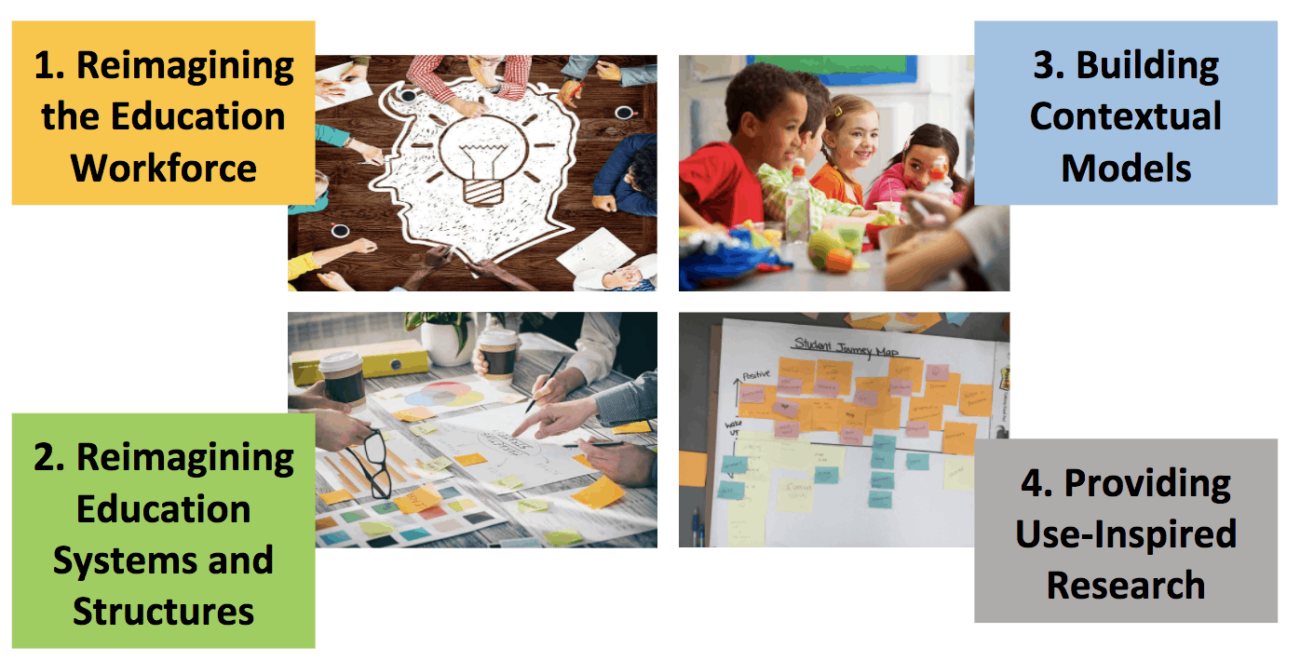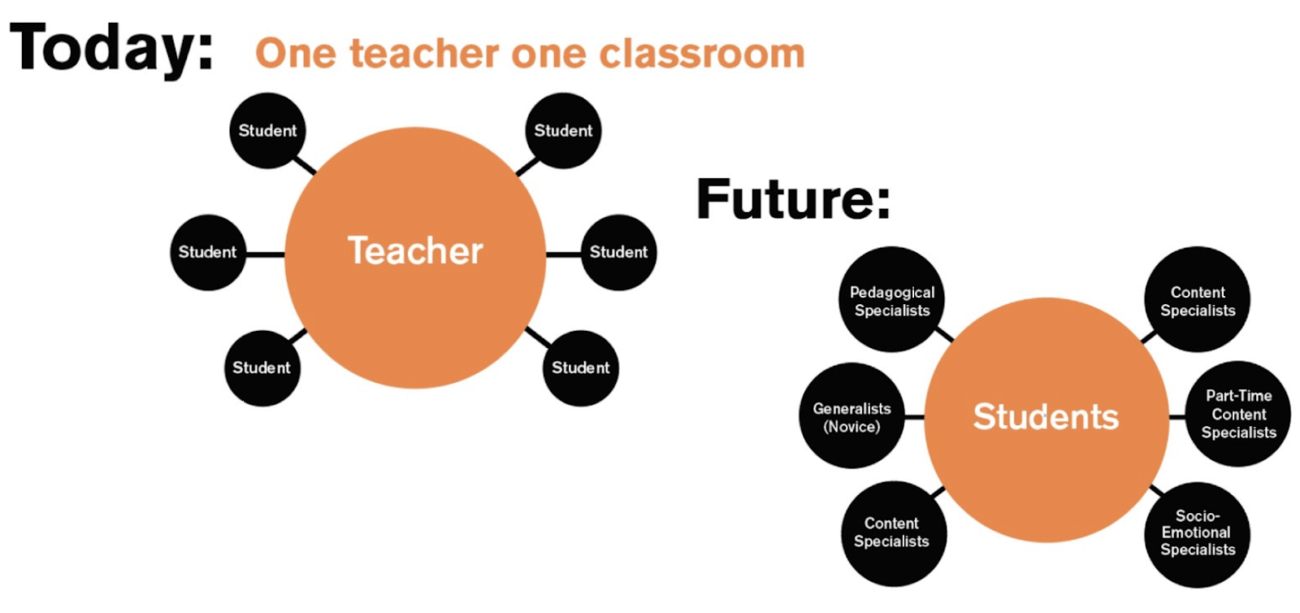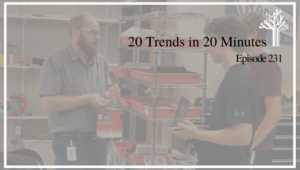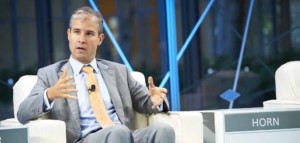How ASU is Building the Capability and Character of Educators

Leading the education school at what has been called the most innovative university comes with some pressure to innovate. Carole Basile is in her second year as dean of the Mary Lou Fulton Teachers College at Arizona State University (@asueducation). With about 5,800 students (including 2,400 undergrads), it’s one of the largest educator preparation programs in the country.
Dr. Basile and the talented faculty recognized that the innovation economy requires new learning models and that new and transformed schools require a new kind of preparation.
Recognizing that we can’t keep providing inadequate preparation for obsolete learning models, Dr. Basile and the talented faculty have responded with important initiatives to support new learning models and develop the capability and character of the regional education workforce.
New Prep for a New Staffing Strategy
Arizona has a teacher shortage and a performance problem. Low pay, isolating work and crowded classrooms are contributing to a steady decline in students pursuing education degrees.
Basile concluded that incremental improvements to preparation were an insufficient response–the complex problem requires new learning models and a reconceptualized approach to workforce development. Four core strategies emerged from faculty dialog: developing 21st-century educators, working with schools, building new models and providing use-inspired research.
Carole realized ASU needed to simultaneously help schools design new approaches and prepare educators to be successful in new school models that cultivate more creativity and less compliance, that are team-based and rely less on isolated contributions and dynamically adjust to personalize learning for students and educators. 
ASU developed partnerships with school districts in metro Phoenix area where they host community design labs. ASU faculty help educators construct new personalized learning models.
Basile hired Brent Maddin, the former provost of the innovative Relay Graduate School of Education, to lead the workforce development agenda.
“Imagine,” says Maddin, “an educator workforce that creates a pathway for more positions and is no longer just a single teacher in a single classroom, but rather a team of educators, including managing teachers.”
He identified roles that require unique preparation including novice teachers, specialized teachers, managing teachers, community school connectors and intrapreneurial school leaders. The shift from one teacher working in isolation with a group of students to a team supporting student-centered progressions is shown below:
“Principals will need to think of the strengths of individual educators, assemble teams of educators, forge community partnerships, budget at the district and school level, increase personalization for students, among other responsibilities.”
Maddin points out. “We are meeting with 15 school districts around the Phoenix metro area on a monthly basis to help craft what the emerging roles within their systems will look like.” Maddin is certain the people in these roles will need additional skill sets. “I could imagine specializations within the iLeadAZ Principal Preparation Pathway program for these managing teacher roles, with a lot of the responsibilities a principal would have,” Maddin says.
“There are many more conversations that need to happen among educators, colleges of education and community leaders,” Maddin says. “We are eager to have them. Close partnerships will help us make something truly great here and ultimately improve the experience that leaders, teachers and learners have in our schools.”
Most prospective teachers participate in the well regarded iTeachAZ program which includes a full-year student teaching residency in a school.
For other educators not seeking certification, ASU launched an Education Studies degree program. It now serves 550 students.
Personal Transformation for Systems Transformation
In January, ASU was awarded a $12.4 million grant by the Kern Family Foundation to develop and incorporate character education into its teacher and leadership preparation programs.
Most schools of education are a grab bag of survey courses that always includes a review of pedagogy but almost never considers the character displayed by the educator. But as David Brooks recently observed, “When you learn about successful principals, you keep coming back to the character traits they embody and spread: energy, trustworthiness, honesty, optimism, determination.” He added, “Social transformation follows personal transformation.”
Basile said the desire to address character education arose from the conviction that one core purpose of education is to support the development of citizens who have the habits of mind and disposition to maintain civil society and serve the public good.
“The great American experiment in self-government has always rested on our ability to educate citizens capable of reasoned argument, respectful discourse and the hard work of balancing individual ambitions and the public good,” Basile said.
While the college’s curricula and programs have emphasized service learning and social responsibility, Basile said the Kern grant allows the college to bring a “new level of intentionality and structure” to the work of integrating concepts of character and character development into the systems, norms, curricula and processes of the school.
As the first effort of its kind at a college of education, the faculty has engaged in spirited discussions about the meaning of character and the role of a college of education in nurturing it.
“We arrived at an approach to character education that aims to prepare our students to be effective educators and caring citizens,” Basile said. “Our conversations led to a view of character education based on ideas of equity and reciprocity. It embraces difference, multiple perspectives and the complexity of social life.”
Rather than offering simple answers, Basile said the ASU program will help educators ask the right questions, “How to create informed learners?” and, “How to promote moral and just citizenship?”
“American parents say that the formation of strong character is their highest aspiration for their children,” Kern Family Foundation President James Rahn said. “Ninety percent of Americans say our democracy is only as strong as the virtue of its citizens.
The grant seems particularly timely given the rise of artificial intelligence. “We simply must ask, how will interacting with ‘smart’ agents affect our interactions with other humans? With this level of immersion, it will be increasingly important to educate the future developers in the humanities,” said John Balash, Entertainment Technology Center at CMU. “We must strive to create experiences that have purpose—reinforcing what makes us human,” added Balash.
The increasing importance of developing character particularly among educators drove the Kern Family Foundation to sponsor a preparation program focused as much on mindsets as methods. “We are confident in ASU’s ability to bring this vision to reality and to become the anchor of a national network of colleges of education committed to character education,” said Rahn.
The framework developed by the college identifies four kinds of character: moral, civic, intellectual and performance. It also identifies four social environments that the college’s approach to character education will address: interpersonal, university, PK-12 learning environments and the larger communities in which schools reside.
Basile thinks educators should be able to work within organizations and systems to ask the right questions, navigate uncertainty, and work in teams to design and create solutions to the toughest challenges. They call it creative intrapreneurship. “We view character as a vital complement to the innovative energy of creative intrapreneurship. It adds purpose to innovation,” said Baile.
The grant will support program materials, research, and an annual convening of scholars, education leaders, nonprofits, policymakers and others to further explore the role of character education in the preparation of teachers and education leaders.
For more, see:
- Education Systems Should Be Based on How Students Develop
- What Policies and Practices Can Make Learning Personal for All?
- A Unique Moment in Education Changemaking
- Shadow a Student: Reinventing the School Experience
- The Rise of AI: What’s happening, What it Means, How to Prepare?
Stay in-the-know with all things EdTech and innovations in learning by signing up to receive the weekly Smart Update. This post includes mentions of a Getting Smart partner. For a full list of partners, affiliate organizations and all other disclosures, please see our Partner page.









0 Comments
Leave a Comment
Your email address will not be published. All fields are required.